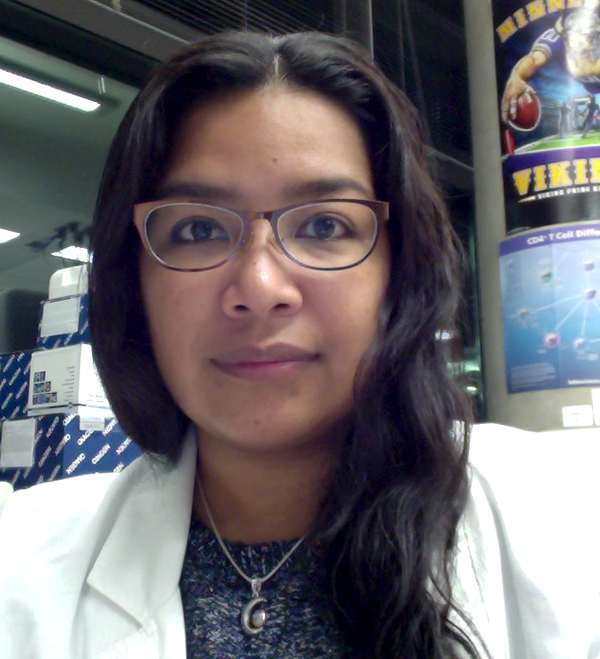
The Office of Diversity, Equity, & Inclusion newsletter highlights several international students that play an important role in advancing healthcare innovations through research at the U every month. Recently, postdoctoral fellow Milagros Silva Morales, Ph.D. was interviewed in the section International Biomedical Researchers Spark Innovation at the U. "By improving our cultural competence, we collaborate effectively with people of diverse backgrounds and cultures," Dr. Silva Morales said. "In turn, we improve the understanding of our coworkers and patients’ belief systems and values, have better research teams, and provide better patient care." Read more.
International Biomedical Researchers Spark Innovation at the U
August 5, 2021
Office of Diversity, Equity, & Inclusion
The COVID-19 pandemic has highlighted the importance of the biomedical community, which is comprised of a large percentage of international physicians and researchers.
Nationally, 25% of science and technology workers and around 50% of the doctoral-level science workforce were born outside the U.S. The international research community across the University of Minnesota Medical School is critical to developing new innovations and advancing medicine. Meet some of the researchers supporting the Medical School:
Milagros Silva Morales, PhD

Hometown: San Rafael, Veracruz, Mexico
Research interest: Since moving to the U.S., I have been working on the project “Peripheral Immune Self-Tolerance Mechanisms: CD4+ T cell Anergy and Treg cells.” I have been developing model systems to study these mechanisms on polyclonal CD4+ T cells in healthy hosts after antigen recognition. The study of these cell populations and mechanisms are critical, as they protect against autoimmune diseases. A greater understanding of CD4+ T cell anergy and anergy-derived T cells will open up the possibility of improved efficacy of cancer immunotherapy.
What brought you to the University of Minnesota?
I wanted to gain more expertise in cancer biology, and pursued predoctoral research training at the University of Minnesota, where I worked with micro RNAs and metalloproteinases to analyze migration and metastasis of cancer cells.
What has your experience as an international student been like?
I have had the spectrum of experiences at the University of Minnesota, some good and others not so much. But, all of them have allowed me to be the researcher and person that I am now, and to be more aware of the differences in education and culture here in the U.S.
I have been an international research trainee as an undergrad student, and now as a postdoctoral fellow. I have worked on different projects in different departments at the University, and certainly realized that some departments and labs are more welcoming than others. The level and quality of research is wonderful, and I have learned so much and increased my passion for science. Also, I have experienced how time consuming science can be, and sometimes people focus on only that. Many other people, besides doing their research, are more aware of what is going on in their surroundings, and have made me feel welcome, visible and have become part of my professional and/or support network.
In your opinion, how do diverse perspectives enhance research/clinical care?
Science is a field that intersects with multiple areas and serves the needs of a diverse population, similar to the healthcare system. I believe that two main aspects we have to be constantly working on are:
Listening and respecting all the diverse, broadened perspectives in our specific workplace
Improving our cultural competence.
By listening and respecting others we will improve our work environment, and by improving our cultural competence, we will collaborate effectively with people of diverse backgrounds and cultures. In turn, we will improve the understanding of our coworkers/patients’ belief systems and values, have better research teams and provide better care for our patients.
What are your future professional/research plans?
The immunology field intersects with multiple areas of biomedical science – from infectious disease, vaccination, autoimmune diseases and cancer – to the life science industry. I would like to keep training and increase my expertise in the immunology field to develop independence and facilitate scientific discoveries that have an impact on autoimmune diseases or improve efficacy of cancer immunotherapy
Perhaps more importantly to me, I want my success in science to promote diversity and inclusion in science at the University of Minnesota, or the university where I become a principal investigator. I have always been passionate about working on community service in each place that I have studied and worked. In the U.S., I identify as a woman of color, and I have to overcome many new obstacles that make my “leaky pipeline” bigger, such as a language barrier and cultural differences.
I am now the president of Empowering Women in Science (EWIS) at the U of M, and my career path has given me a special perspective on how to work and improve environments for people/scientists of diverse backgrounds. For all people reading this newsletter: I am always happy to support and chat with other students and scientists about DEI advocacy and my research, so feel free to reach out to me. Visit the EWIS website and join our group if you are interested in being an ally for others around you.